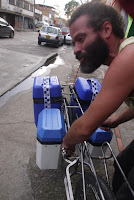 |
| The Vuelta a Colombia's peloton in 2016. |
However, the Vuelta has lost stature during recent decades due to Colombia's violence, loss of big sponsors, and Colombian cycling stars' preference for focusing on European racers. Fewer foreign teams have participated, even tho La Vuelta offers climbs higher than those of the Tour de France.
And now, a doping scandal, has dealt it another blow - just when Colombian cycle racing seems to be entering a new golden era.
During this year's Vuelta eight riders tested positive for banned substances, mostly CERA, a blood booster, and seven of the eight were Colombians. (A second blood or urine sample will now be tested to confirm or negate the first results.) One of the positives belongs to under-23 champion Róbinson López. That's a huge number relative to the number of race participants and the small number of ricers tested: Only the stage winner, race leader and two riders chosen at random were tested at each stage. If that limited testing produced eight positives, it suggests that many more doped but were not caught. More positive results may, in fact, still be announced.
Colombia's drug testing capacity is limited. Its only internationally certified laboratory was closed down temporarily this year after it produced incorrect results for samples secretly mailed to it by the World Anti-Doping Agency. The Vuelta samples were tested in a U.S. lab.
Among other problems, such as lack of resources, Colombian doping controls suffer from a fundamental conflict of interests because Coldeportes is both a cycle-racing sponsor and responsible for anti-doping control, reports Bicycling magazine.
The Cololmbian Cycling Federation's responses have been less than reassuring. When, during the Vuelta, Swiss cyclist Alexandre Ballet told a journalist that he'd seen pills being handed out, the Colombian federation sent a protest letter to the Swiss Cycling Federation asking Ballet to "make clear that he did not mean that Colombian cycling was dirty."
"We are very surprised by these declarations, which cast a shadow over our organization," and anti-doping efforts.
Sadly, Ballet's criticisms were evidently right on.
By Mike Ceaser, of Bogotá Bike Tours























